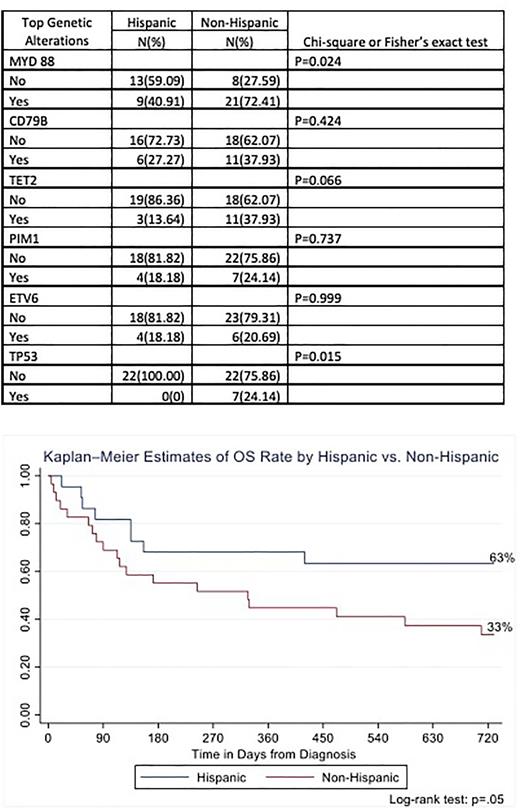Abstract
Background:
Primary central nervous system lymphoma (PCNSL) is characterized by frequent MYD88 L265P activating mutations, biallelic CDKN2A loss, and mutations in CD79B, PIM1, and CARD11. However, the extent to which mutations vary by ethnicity is unknown. The purpose of this study is to describe differences in genetic mutations and survival between PCNSL patients of different ethnicities.
Methods:
We retrospectively analyzed patients ≥ 18 years with PCNSL diagnosed between January 2011- December 2020 and treated at UCSF-Fresno and University of Oklahoma. Next generation sequencing was performed on Formalin Fixed Paraffin Embedded tissue. We examined mutations in 434 genes by DNA analysis and 1408 genes by RNA analysis. Sequencing was performed using an Illumina NextSeq 550 system platform.
The clinical data including age, sex, ethnicity, race, ECOG performance status, number and location of lesions, HIV status, LDH, protein in the CSF, and treatment regimens were reviewed.
Treatment response was assessed by MRI using the international consensus group response criteria.
Comparison of patient characteristics and rate of genetic alterations between Hispanic and Non-Hispanic patients was done using the Fisher exact test or Chi-square test.
Time-to-event analyses were conducted using the Kaplan-Meier method and were compared by a log-rank test. Univariate analyses were performed via the Cox proportional hazards model.
Analysis was performed with STATA version 16.0.
Results:
Among the 51 patients analyzed, the median age was 61. 54% were males and 43% were Hispanic. 13% had HIV, 27% had deep brain involvement, and 58% had non-germinal center (non-GC) type per Hans Criteria. 81% of Hispanic patients had non-GC vs 41% non-Hispanic (P=0.006). There was no statistically significant difference in age, performance status, HIV status, deep brain involvement, or CSF involvement between Hispanic non-Hispanic patients. 90% of patients received systemic chemotherapy for initial treatment, with 41% receiving high dose Methotrexate, Rituximab and Temozolomide. No patients received autologous stem cell transplant in first remission. 90% Hispanic Vs 89% Non-Hispanic received systemic chemotherapy (P=0.447).
29 patients (56%) achieved complete response (CR)/unconfirmed complete response (CRu).
2-year progression-free survival (PFS) was 67.4%, and 2-year overall survival (OS) was 55% for all patients.
177 genetic alterations were detected with the most common being MYD88, CD79B, TET2, PIM1, ETV6 and TP53 (table).
Hispanic patients, compared with non-Hispanic patients, had a lower rate of MYD88 mutation (40.9% vs 72.4%, P=0.024) and TP53 mutation (0.0% vs 24.1%, P=0.001).
2-year PFS in Hispanics was 40% vs 30% in non-Hispanics (P=0.526) and 2-year OS in Hispanics was 0.63% vs 0.33% in non-Hispanics (P=0.05). In univariate analysis, age and genetic alterations (MYD88, CD79B, TET2, PIM1 and ETV6) were not associated with significant differences in 2-year PFS or OS. Performance status (ECOG ≤ 2), negative CSF cytology, and treatment with multi-agent chemotherapy rather than high dose Methotrexate alone were associated with better 2-yr OS.
Conclusions:
We identified highly recurrent genetic alterations in PCNSL. Our data suggest that some heterogeneity in the most frequent mutations in PCNSL may be related to ethnicity. Hispanic patients in our study have better 2-year OS; however, the data is limited by the retrospective analysis and the small patient number. Further studies on a larger patient population are warranted to evaluate genetic heterogeneity in different ethnic groups and effect of ethnicity and socio- economic status on outcomes in patients with PCNSL
Disclosures
Abdulhaq:Genentech: Membership on an entity's Board of Directors or advisory committees; Oncopeptide: Speakers Bureau; Jansen: Membership on an entity's Board of Directors or advisory committees; Novartis: Membership on an entity's Board of Directors or advisory committees; BMS: Membership on an entity's Board of Directors or advisory committees; Amgen: Membership on an entity's Board of Directors or advisory committees, Speakers Bureau; Morphosys: Membership on an entity's Board of Directors or advisory committees, Research Funding; Alexion: Speakers Bureau. Wieduwilt:BMS, Jazz, Gilead/Kite: Membership on an entity's Board of Directors or advisory committees; Sorrento: Other: Data monitoring committee; Reata: Current holder of stock options in a privately-held company. Albitar:Genomic Testing Cooperative: Current Employment, Current holder of stock options in a privately-held company.
Author notes
Asterisk with author names denotes non-ASH members.


This feature is available to Subscribers Only
Sign In or Create an Account Close Modal